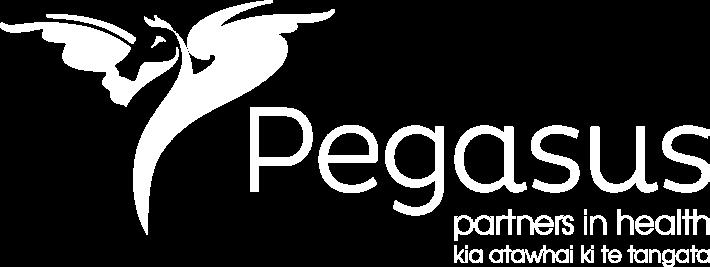


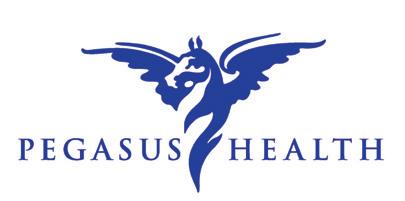






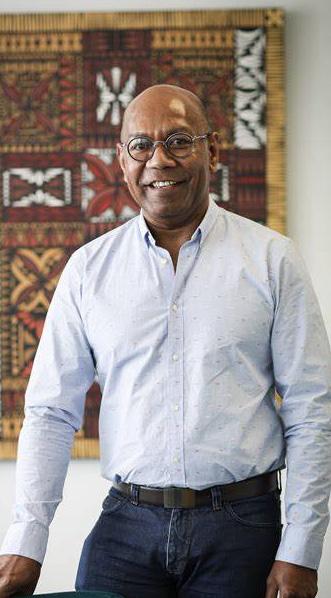












Tēnā koutou katoa, Our thoughts are with our colleagues, friends and whānau in the upper North as they continue to endure wild weather and the clean up that will follow. As Cantabrians know from experience, feeling connected and supported during these times is critical to maintaining your resilience and wellbeing. If you have not already, reach out to those you know who are affected to check in that they are looking after themselves and not neglecting their mental and emotional wellbeing.
Tūngia te ururua kia
tupu whakaritorito te tupu o te harakeke.
Clear away the overgrowing bush so that the new flax shoots will spring up.
This month we look back over 30 years of Pegasus Health. Ensuring that the people of Canterbury have the very best in primary healthcare has always been at the heart of what we do. One of Pegasus Health’s founders, Professor Les Toop, shares the journey of Small Group Education from a cohort of sixty doctors to hundreds of primary healthcare clinicians across pharmacy, general practice and nursing.
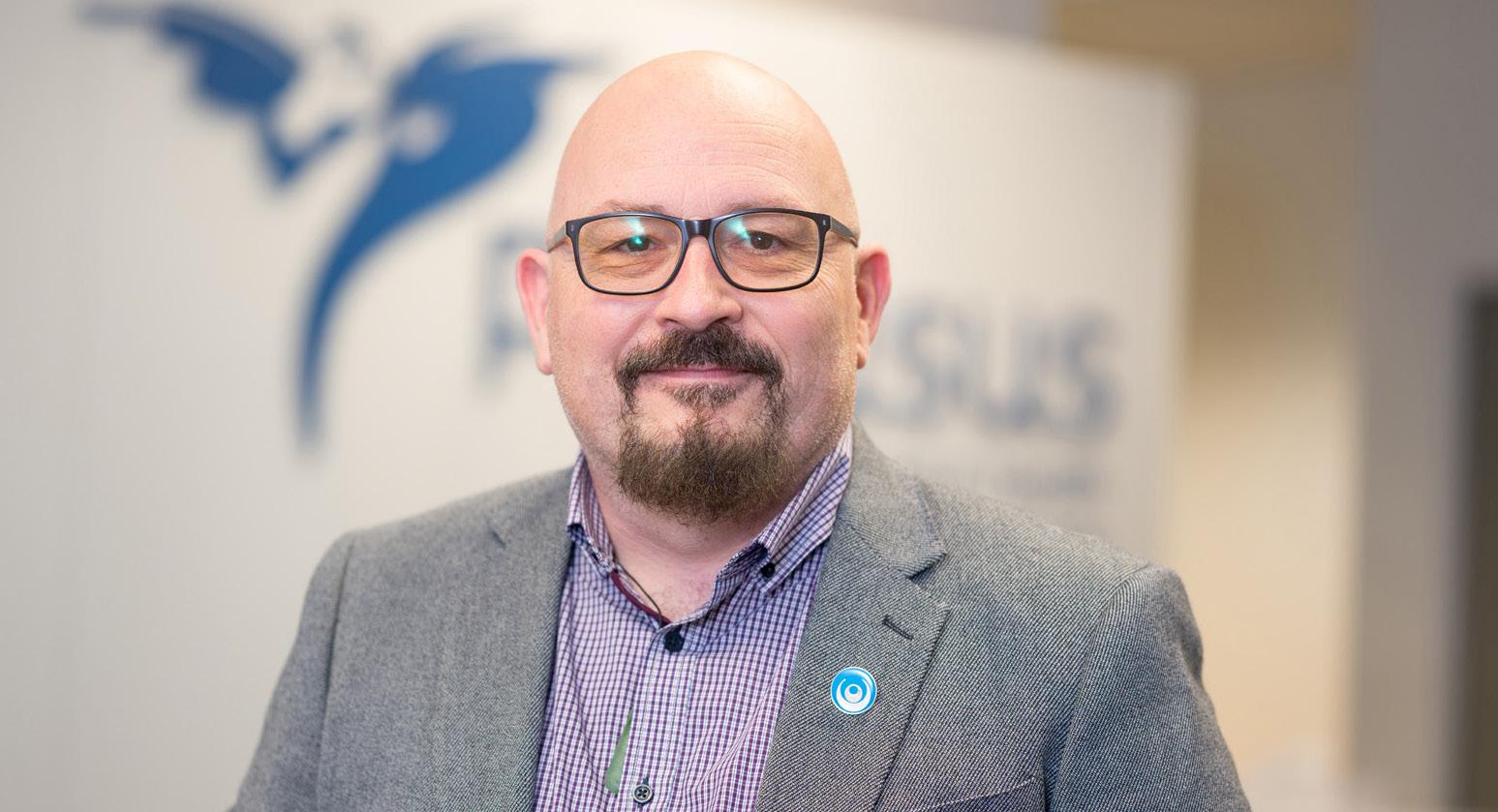

We farewelled our five Students in over Summer at the end of January. It is always a privilege to spend time with the students and I am assured that the future of healthcare is in good hands. The projects that they completed during their time here has added real value to the work we do at Pegasus.
MARK LIDDLE MANUKURA | CHIEF EXECUTIVE OFFICERPegasus Health’s approach to delivering education through small, peer-led groups has been so successful that it has been adopted in many sites across Aotearoa and is currently being established in the North of England.
A small group of Christchurch General Practitioners, including Professor Les Toop, established the Small Group Education programme in the early 1990s and Professor Toop

“Soon after Pegasus was set up, an opportunity arose to share the budgetary risk for community laboratory testing and pharmaceuticals within Canterbury, an area which had historically seen high costs in these areas compared to other regions,” Professor Toop explained.
The focus for Pegasus was not just on reducing costs, but also to provide better health outcomes for patients. At the time, there was a lot of both over-prescribing and under-prescribing and the goal was to reduce variation, thereby reducing both under and over-investigation and drug treatment to better meet the needs of the people of Canterbury.
“We needed to seek out and present the evidence to doctors in an interactive way. We decided a small group format with peer leaders would be ideal,” Professor Toop said.
With 60 doctors in four small groups, the programme began. There were also other parts to the programme including bulletins and feedback both around lab testing and variation in prescribing. Within short order, almost all Pegasus Doctors (several hundred) belonged to groups. Later it was also opened

to all non-Pegasus doctors across Canterbury.
“Small Groups quickly became the glue of Pegasus. It was one of the few opportunities for practitioners to come together in groups to discuss work matters, and it offered Pegasus Directors an opportunity to attend and have a two-way conversation about what was going on in Pegasus and what was going on in practices,” Professor Toop said.
While Small Group Education still has a strong focus on new medicines, new tests and clinical education, it has evolved to also include broader topics that impact the delivery of high-quality, modern health care with a strong focus on equity.
In the late 90s and early 2000s, Small Group Education expanded to include practice nurses and later again, pharmacists, nurse practitioners, and eventually the formation of multi-disciplinary groups. This multi-disciplinary membership enables group leaders

to understand and share the different perspectives that exist across primary care ensuring patients get consistent messages and supporting the changing roles within primary healthcare teams.

“Our education programme is about quality improvement and is so much more than simply clinical updates. It tries to focus on areas of uncertainty where evidence is not black and white or is disputed. That’s what works best; when you can debate and when they’re interactive with practitioners young and old able to share their experiences and concerns safely,” Professor Toop said.
A few years ago, Les stepped down from his position as Head of the Department of General Practice and recently moved to emeritus status at the University of Otago, Christchurch. He continues in practice in Phillipstown where he’s been serving the community for 36 years at Ferry Road Medical Centre. He also continues to lead a Small Group and provides valuable advice and support to the Clinical Quality and Education team.
Dr Apisalome Talemaitoga was awarded an Officer of the New Zealand Order of Merit for his services to Health and the Pacific community.
Part of Dr Talemaitoga’s work, included developing the Pegasus Health Pacific Reference Group in the late 2000s. Successes from this group were an increased rate of cervical screening amongst Pacific communities and scholarships to support Pacific students.

He is a trusted source for the community, explaining complex terms in an understandable way, and promoting longterm health to this vulnerable population.

Read more about Dr Talemaitoga’s award here
Dr Amama Bagem Thornley was awarded a New Zealand Order of Merit in the New Year’s Honours for services to health.

Dr Thornley plays an active teaching role in the Etu Pasifika clinic in Christchurch, mentoring GP Trainees and Trainee Interns. She supported the national ‘Doctors for Sexual Abuse Care’ organisation, now Medical Sexual Assault Clinicians Aotearoa, and played a key role in the establishment of their Christchurch clinic in 1994.
Read more about Dr Thornley’s award here.
To celebrate our 30 Year Anniversary here at Pegasus Health we sat down with Mary Fleming, our longest-standing employee of 35 years to look at her work journey and the highlights of her career.

What has changed the most over the last 30 years working at Pegasus?
Our processes, technology and our pandemic response come to mind. Our dedication to helping people remains the same.
How much has 24 Hour Surgery grown from when you first started?
I remember starting at our Bealey Ave location in the late 80’s it was an old Villa with Dr Paul McCormick, Jorgensen Schoesboe and the late Ian Robertson. We were a small close-knit team offering 24 hour medical care - the first of its kind in Christchurch.

What is your favourite memory working at Pegasus?
It is true what they say, it is the people, it is the people, it is the people. I have made lifelong friends working here and I still catch up with those friends that I started with over 30 years ago!
What roles have you done since starting with Pegasus?
Medical Receptionist for 35 years. Wild I know!
What is it about Pegasus that made you stay for 35 years?
In the early years, it was the shift work flexibility that I enjoyed, it was helpful when we were bringing up a young family and I have also enjoyed meeting different people and helping them when they are potentially at their lowest.
Any stories or memories you’d like to share?
I will always remember coming into work when we had major snowfalls and the police would have to pick us up and take us into the surgery!

To celebrate Pegasus Health’s 30 year Anniversary, we hired local Christchurch Artist, Ellie Compton to create a mural that highlighted the last three decades. The concept for the new mural is based on Pegasus’s timeline being seen as a haerenga (journey). The path with our awa (river) alongside takes you through some of the key milestones and events that have happened over the past 30 years.

Geographical and cultural elements from Ōtautahi and Waitaha (Christchurch and the Canterbury region) are also an important and big part of the mural – Marae, Aoraki, Canterbury plains, Kaikoura whales/seals, trees - Totara and Kahekatea bringing growth along the pathway.
“I have noticed people standing by the mural discussing some of the events and moments that are shown. It is sparking connection and conversation,” Sarah Mitchell, General Manager of People & Culture said.
Alongside the new timeline mural, Ellie Compton designed a visual representation of our strategic direction. This shows our work focused on three areas:

•Patient Services
•Provider Services
•Systems Improvement.
These areas are supported by Corporate Services and underpinned by our Role and Purpose.
Halswell Pharmacy has adopted a sustainable approach that aims to minimise the environmental impact of their dispensary.
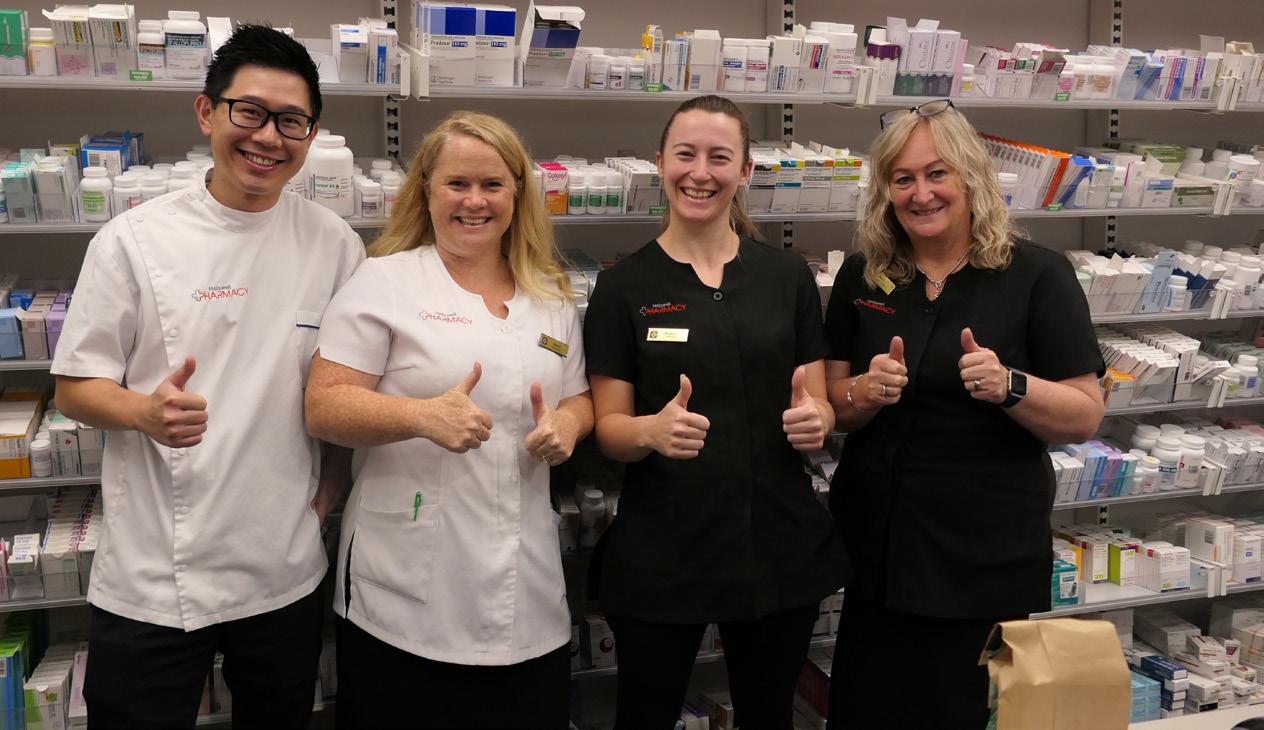
Pharmacist, Loren Vincent, and owner, Karen Frater, have spearheaded this initiative that sees waste diverted from landfill and wastewater to more environmentally-conscious resting places.
“We have always done some recycling of cardboard and plastics, but we are now recycling soft plastics and aluminium as well. We have also
stopped pouring our leftover antibiotics down the sink,” Karen said.
While traditionally, the dispensary had discarded small amounts of leftover antibiotics down the drain, they now collect these in a recycled plastic bottle to be included in the hazardous waste rubbish along with other returned and expired medication. This mitigates wastewater contamination.
As well as collecting used foil blister packaging, the staff also collect the foil seals from bottles for recycling.

“All it takes is someone to drive it and a boss that is willing to make it happen,” Karen said.
• Collect used foil blister packaging and seals. These can be recycled at EcoDrop at Council refuse stations.
• Collect soft plastics for recycling. Many supermarkets offer collection bins for soft plastic recycling.
• Collect and store antibiotic liquid in an old, recycled bottle. Include them in your hazardous waste bags. This keeps chemicals from entering the wastewater.
• Controlled medications which require destruction can be turned into a slurry and mixed with kitty litter to go into your hazardous waste bags. This allows the packaging to be recycled separately.
• Invite your community to donate their brown grocery shopping bags to use for bulky prescriptions.
• Find an alternative to printing your Certified Repeat Copy slips. Halswell Pharmacy saves over 90 sheets of A5 paper a day by not printing these.

Many Pegasus Practices were able to enjoy a well-earned break over the holidays thanks to cover from Practice Plus providing virtual consultations for their patients.
During the period December 25 2022 to January 8 2023, Practice Plus saw 83 Pegasus patients from across 45 practices, resolving 96% of consultations without requiring further assessment.

The patients that presented ranged from newborns to people over 70 years old.
For Pegasus patients, even while on holiday elsewhere in the country, Practice Plus clinicians have access to HealthOne, NZePS and Laboratory results to review a comprehensive medical history of their patients. Numerous presentations were for respiratory-type infections, with patients also being prescribed antivirals for COVID-19.
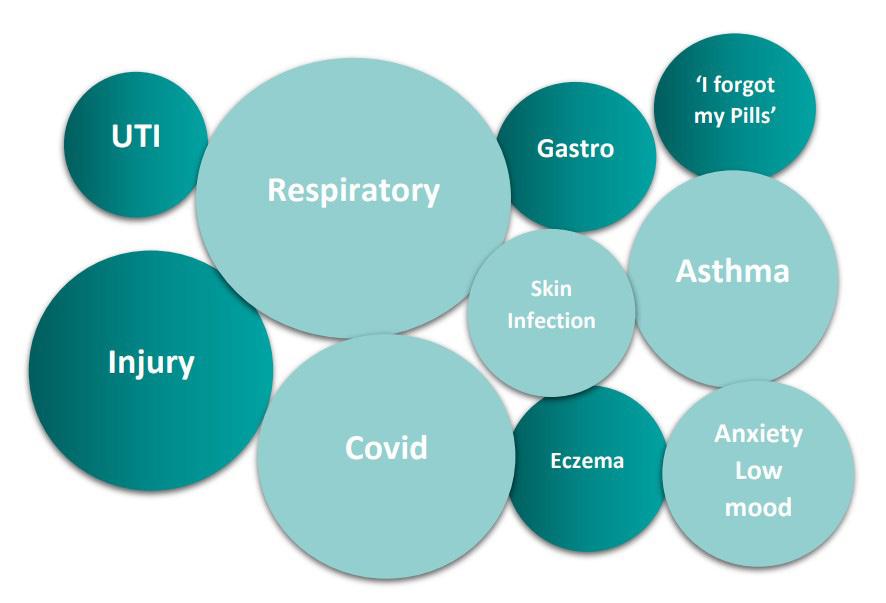
Read the full report here.
If you would like to know more about Practice Plus, contact your Practice Relationship Manager or direct call on 0800PRACPLUS

The Pegasus Health Practice Relationship Team is now offering specialised succession support for general practices and individuals looking to buy into a practice or for those owners looking to sell their ownership.

The Practice Relationship Team has identified that some general practices are wanting support with succession planning. With almost half of general practitioners predicted to be retiring in the next 10 years, succession planning is critical for practices.
“Now that practices are getting back to businessas-usual as COVID-19 requirements decrease, many practices and owners are taking this opportunity to review practice structures and progress succession planning if they have not already,” said Operations Manager for Provider Services, Rachel McAllum.
The Practice Relationship Team has been working with Medical Assurance Society (MAS) to upskill and develop support tools for practices and individuals, who want further support for succession planning or considering buying or selling ownership of general practice. One key tool is a video of a webinar presented by Shaun Phelan from MAS, which looks at what both buyers and sellers need to consider in their succession planning and the processes of buying or selling ownership of general practice. Pegasus would like to acknowledge the support from MAS and other professional providers throughout this development project.

There is a feeling among our younger GPs who might have young families, student debt and a home mortgage, that ownership is not attainable for them. This video discusses areas that help you to understand the key aspects when considering buying or selling ownership of general practice. It gives examples of due diligence, business models, pricing, and valuations for you to consider.
The Operations Manager for Provider Services and the Practice Relationship Team is available to provide confidential support and advice about the process and the due diligence buyers and sellers should be undertaking before entering negotiations. They are, however, not able to be a part of the sale and purchase process but support you to understand the areas that make up the full processes required. The team have begun creating a confidential database of those wishing to buy or sell ownership, that may be able to support matching potential buyers and sellers.
To support any buyers or sellers wishing to discuss this confidential service for succession planning or buying/selling processes please contact Rachel McAllum, Operations Manager Provider Services at Pegasus Health. Contact Rachel McAllum, Operations Manager Provider Services on 0274 280 335 or email Rachel.mcallum@pegasus.health.nz
Over the last three years, Pegasus has made a commitment to developing and supporting diversity in our workforce. One way we do this is through the Students in over Summer (SIOS) programme, which is an initiative that focuses on exposing a diverse range of health students to work in primary care.
Over December and January, Pegasus had five students from Māori, Pasifika or Culturally and Linguistically diverse (CALD) backgrounds studying in health (Medicine, Nursing, or Allied Health) working in various teams.
The kaupapa is codesigned between Pegasus and the student to help further develop their professional skills and the mahi they work on adds value to our local communities.
 Kirstyn MacDonald (Māori, Ngāti Kahungunu)
Kirstyn MacDonald (Māori, Ngāti Kahungunu)
Third year Bachelor of Nursing
Kirstyn was inspired to study nursing to better the approach and delivery of healthcare specifically for young Māori māmā and whānau.
“Seeing the wāhine toa in influencing roles at Pegasus has shown me a different pathway to be able to help my Māori whānau and community outside of a clinical role,” Kirstyn said.
Kirstyn’s work at Pegasus involved her scoping a cultural support role. A review of similar roles in other Primary Health Organisations (PHO) revealed both navigator roles for tangata whai ora and also cultural advisory roles for clinicians and PHO staff.
“I have discovered that a lot of the cultural support, both here in Pegasus and in other PHOs around New Zealand, is informal. It is having discussions internally about how they can better their interactions with Māori and there is not actually a specific role,” Kirstyn said.
There is a lack of cultural awareness for Māori kaupapa. Kirstyn suggests that any cultural support role should focus on Māori kaupapa and should help kaimahi to be more culturally considerate in their work.
Wikitoria’s time with Pegasus was grounded in connection and collaboration. Her work with Pegasus kaimahi, Māori and Pasifika providers, and her fellow students was all about making connections and working together.

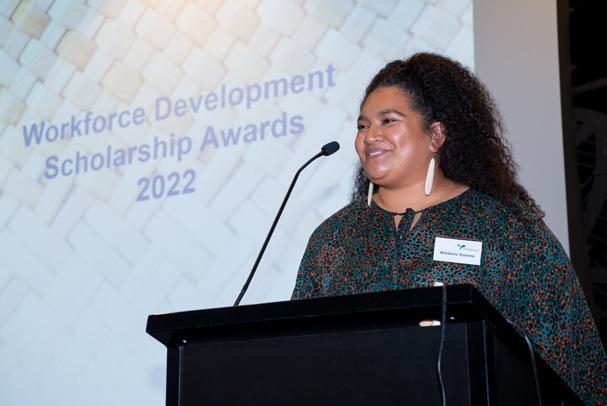
“My dad’s favourite whakatauki was always on my mind. He aha te mea nui o te ao, He tangata, he tangata, he tangata. What is the most important thing in the world? It is people, it is people, it is people,” said Wikitoria.
Wikitoria worked within the Equity Leadership team looking at manaakitanga in health and how we could learn from COVID-19, specifically from our Māori and Pasifika services who supported our community during this time.
“Throughout my research and interviews familiar faces and familiar places was a recurring theme,” said Wikitoria.
“When we have this, there is more trust, particularly for those who have not had a good history with our health system.”
Leon worked within the Practice Relationship Team. The work he undertook was in response to feedback the Practice Relationship Team had received from the community and from General Practice staff working in reception and administration roles.
“The project involved looking at some of the gaps that exist in terms of patient engagement when interacting with reception and administration staff,” Leon said.

Leon’s project has seen the development of a video training programme that shares the experiences of a number of Māori, Pasifika and CALD patients. The videos provide context around the difficulties these communities have when accessing healthcare.

“Receptionists are absolutely critical to the patient experience as they are the first and last point of contact,” said Leon.
Third year, Bachelor of Social Work
Knox split her time over summer between the Pegasus Community Engagement and Population Health Team and Vaka Tautua, a Pasifika social services provider.
Working closely with the Here Toitū team, Knox investigated exercise as medicine for clients who experience persistent pain. Her work supports the establishment of the SToMPP programme, a six-week exercise programme.
“SToMPP focuses on all areas of hauora and uses exercise as an intervention for managing pain,” Knox said.
“My time with Vaka Tautua was enriching for me. I was engaged in rich and thoughtprovoking talanoa [conversation] about anything and everything pertaining to Pacific people and health,” Knox said.
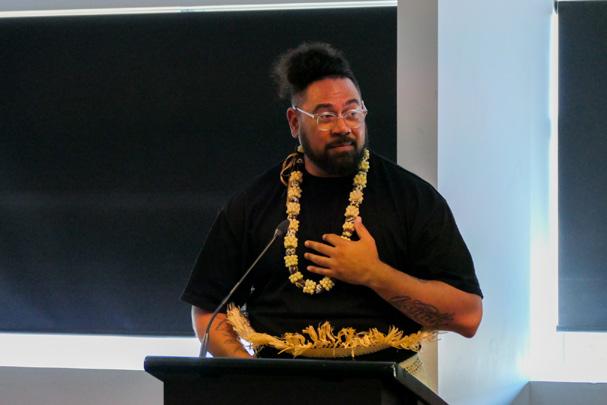
Pretty has lived in New Zealand for 20 years, raising her four children in Christchurch. She has just completed her counselling degree and is about to launch into research, but took a break from study to join the Equity Leadership and Mental Health teams for the summer.
Pretty’s project was to investigate the need and opportunity for group support for former refugees and migrants. When refugees arrive in New Zealand, there is a lot of information presented to them around wellbeing, physical health, education and the English language.
“It is a lot of information, and it is overwhelming. But in that refugee settlement they are with people who are similar to them, people who are going
through the same experience, people who are suffering the same,” Pretty said. However, once they leave the settlements, they can often find themselves isolated. Language is a big barrier to them accessing services and opportunities to support their wellbeing. Pretty’s research uncovered an intervention that could play an important role in supporting our refugee communities.
Self Help Plus, developed by the World Health Organisation, is a stress management course for groups of people who have lived through or are living through adversity and is available in a wide range of languages.
“I am very grateful for my time here and the opportunity to do something meaningful,” Pretty said.
Service expansion aims to reduce those moving to a jobseeker benefit
Responding early is a new preventative addition to the Pegasus Here Toitū service, supporting those aged 16-64 in employment with a health condition or disability who are at risk of losing their job.
Funded by the Ministry of Social Development (MSD), and partnered with THINK Hauora and Orion Health Limited in 2018 they completed a research project that investigated their shared client groups, specifically those who move to a health-related benefit.
Opportunities arose as research showed there were common patterns with General Practice visits in the two years leading up to moving to a Jobseeker benefit.
“We aim to help the individual retain their employment with the help of a Work Retention Specialist through providing support for the individual and the employer,” Here Toitū Team Leader, Loni Beach, said.
This is a free service and is available for people living in the Christchurch region.
Eligibility for Responding Early:
• Aged 16 to 64 years
• Working full or part-time (includes self-employed)
• Living with a health condition or disability
• Their health condition is impacting their ability to work and/or they are at risk of losing their job
• Give their consent to participate in Responding Early
Referrals can be done through:
• ERMS: https://canterbury. communityhealthpathways.org/ Work Assessment and Rehabilitation Requests


• Our website https://www.pegasus.health. nz/your-health/services-for-patients/ here-toitu/
• Team email: HereToitu@pegasus.health.nz

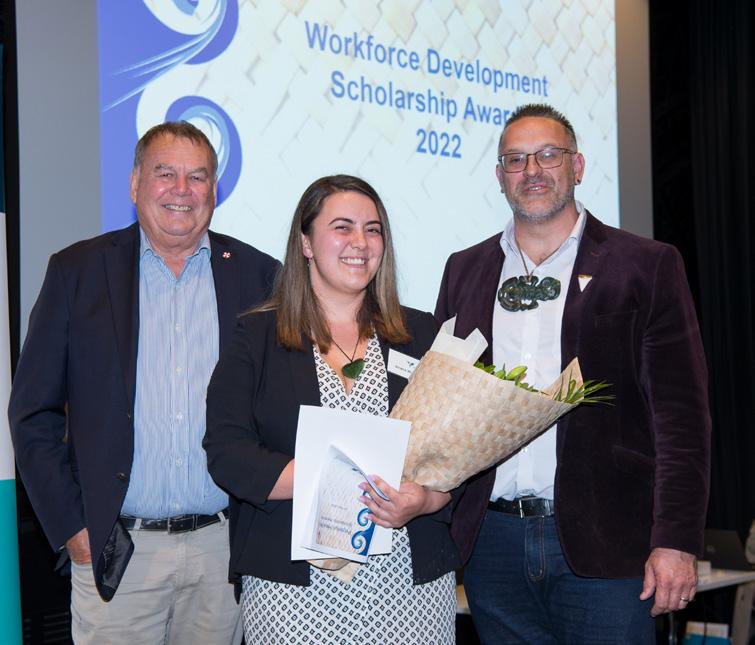
Newly-graduated midwife, Ariana Walker, just accepted her first client. Ariana is based at Manaakitia, a midwifery group practice with a strong kaupapa Māori focus, where she is working under the guidance of Tumanako Stone-Howard.
“I’m surrounded by support, and it’s nice to work with whānau who appreciate the value and mātauranga of what we do,” Ariana said.
Ariana has a passion for bringing traditional Māori practices to the birth experience for māmā who want it. This includes weaving and offering muka, a woven harakeke fibre that can be used to tie the umbilical cord and making her own kawakawa balm for newborns.
When Ariana began her study, she was one of only two Māori students in her year. Together they established a Māori and Pasifika group designed to share study and scholarship advice, peer support, and build a network and community of connections. When Ariana graduated the group had over 40 members and a strong succession plan in place to ensure the group continues to thrive.

Ariana’s mother, Karen, is also a midwife, based in the North Island. Her approach to midwifery care is very much influenced by the style and approach to midwifery care her mother holds.
“We’re a very home birth strong family. All out whānau has been born at home, including myself. It’s something I’m very passionate about,” Ariana said. “Let’s bring birth back home.”

Pegasus Health Annual Report for 2023 is now available to read. The stories within our report help bring the document to life, showcasing some of our many achievements over 2022.


Read the full document here
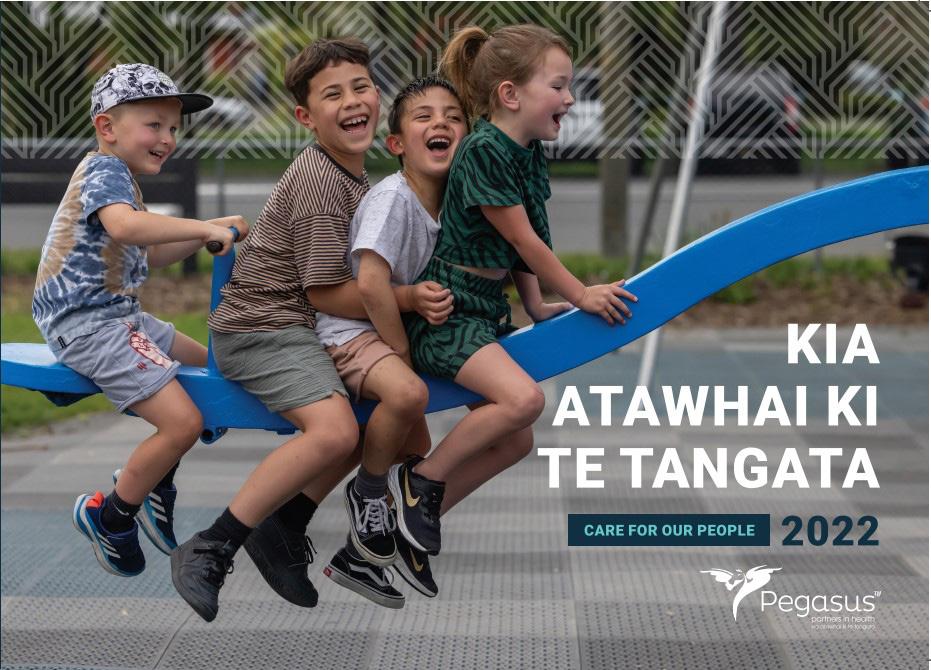
Pegasus 2025 is produced by the Communications Team at Pegasus Health (Charitable) Ltd. Content within Pegasus 2025 newsletters has been included with the approval of content providers therefore please contact us if you wish to reproduce or alter and transmit any of the information or images contained within. Contact communication@pegasus.org.nz
